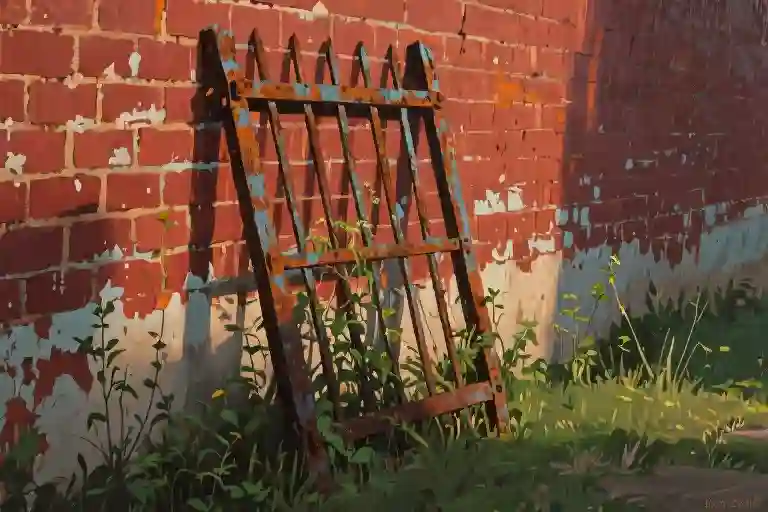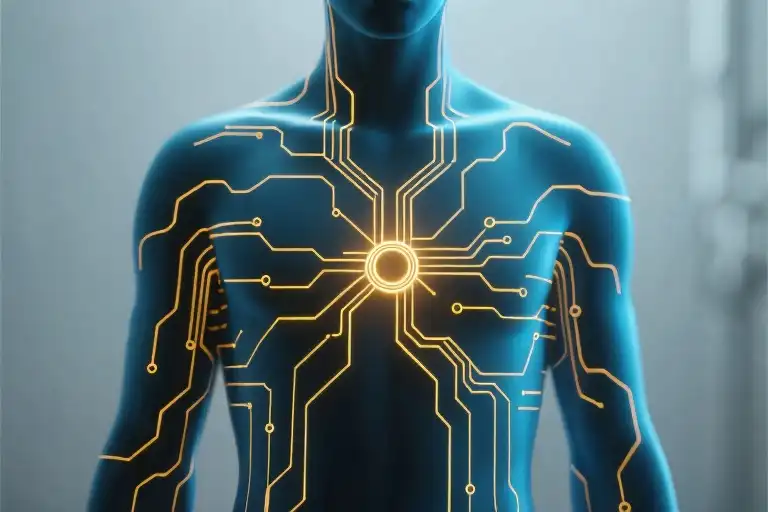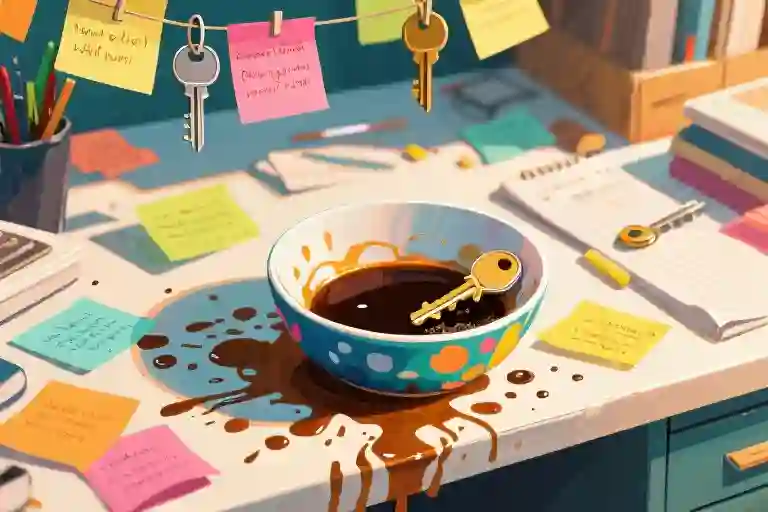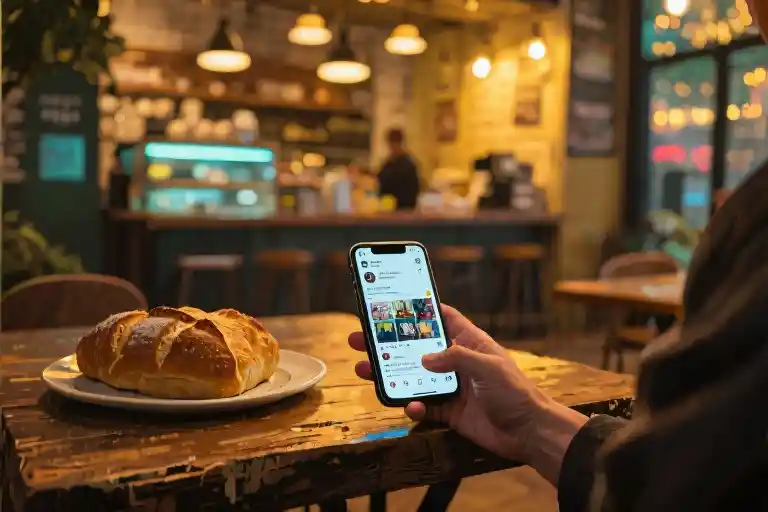The fan groaned. My knee pulsed. The house held its breath in that particular way of mid-afternoon stillness when even the walls seem to sweat. I’d woken up with that familiar craving – the kind running usually kept at bay – but the sharp twinge with every step made it clear today wouldn’t be a running day. Again.
Outside, the sidewalk stretched empty in both directions, that eerie urban silence that feels heavier than actual quiet. For some reason I convinced myself this abandonment had something to do with Father’s Day, though the connection dissolved when I tried to grasp it. The heat pressed down like a physical weight, the kind that makes you question every life decision that led to this particular patch of concrete at this particular moment.
There was something almost comforting about the limp’s rhythm – left step normal, right step dragging slightly, repeat. A metronome for melancholy. I used to joke that running was cheaper than therapy, but the truth wasn’t funny: when my feet hit pavement, the noise in my head quieted just enough to outrun the thirst. Now the limp was back, and so were the cravings, arriving with the inevitability of sunset.
The market could wait. Everything could wait. What I really wanted was to turn around, walk back through that front door, and not come out again until the seasons changed. Seventy days in the half-dark of drawn curtains sounded about right. Funny how the body remembers – I’d done longer stretches in prison, but there the walls were never silent. Here, in this soft incarceration of my own making, the quiet itself became the jailer.
Somewhere beyond the heat haze, birds were singing. Or had been. By the time I registered their presence, the sound had retreated to the edges of hearing, those distant warbles that might just be your brain inventing comfort. The real soundtrack was the traffic – engines rising and falling like some cosmic joke about transience. Brick buildings watched impassively. A single iron gate stood sentinel between patches of struggling grass, but gates only matter when you’re on the wrong side of them.
The Weight of a Limp
The morning run had been a mistake. Not the running itself – God knows I needed that more than ever – but the way I’d pushed through the twinge in my left knee around mile two. That familiar dull ache had started whispering, then shouting, until each footfall sent electric jolts up my leg. By the time I limped back home, the damage was done.
Patellar tracking disorder, the doctor called it last year. Fancy term for a kneecap that couldn’t stay in its lane. The brace in my closet proved I’d been here before, but pride made me leave it collecting dust. Now the joint pulsed like a second heartbeat, swollen and warm to the touch. I pressed my fingers into the puffy flesh, testing the pain’s borders. A stupid habit, really – as if mapping the ache could contain it.
What scared me wasn’t the physical hurt. It was how quickly the craving rushed into the space where running used to be. Three months sober, and I’d built my entire recovery around those morning miles. The rhythm of sneakers on pavement, the burn in my lungs – they’d become my replacement ritual. Without them, my hands felt too empty. My mind kept drifting to the half-empty bottle of bourbon in the garage, its amber liquid catching sunlight through dusty windows.
I tried distracting myself with household chores, but every limp across the kitchen echoed the imbalance inside. The body breaks, the mind caves. Simple as that. The sharper the pain grew, the louder the old voices became: One drink wouldn’t hurt. You’ve earned it. Nobody would know.
By afternoon, the house had become a furnace. The oscillating fan in the corner churned stale air without cooling anything, its mechanical whine layering over my thoughts. I stared at my reflection in the microwave door – hair damp with sweat, jaw clenched – and suddenly needed to escape. Not to the garage. Somewhere neutral. The grocery store, maybe. Anywhere with fluorescent lights and other people’s conversations to drown out the noise in my head.
Lacing up shoes took twice as long with a bum knee. I favored my right leg like an unsteady metronome, each step a reminder of how fragile the system was. Running kept the thirst away. Now the limp was back, and so were the cravings. The math of addiction never changed – take away one coping mechanism, and the others come sniffing around like hungry strays.
A Prison with Soft Walls
The fan’s hum had become a cellmate. It droned on in the corner, marking time in a way that felt eerily familiar. I’d known this rhythm before – not in the comforting predictability of home, but in the fluorescent buzz of prison lights. Strange how freedom could build its own bars.
In prison, the walls shouted. Voices ricocheted off concrete, a constant barrage of human noise that left no room for loneliness. Here, the walls whispered. The silence between the fan’s rotations grew teeth. According to the Pew Research Center, nearly 28% of U.S. households now consist of one person living alone – a statistic that would have shocked my grandparents’ generation. We’ve perfected solitary confinement without the stigma.
My knee gave a sharp protest as I shifted on the couch. The pain was cleaner than the cravings it brought. Running used to stitch me together – the steady pound of sneakers on pavement keeping darker impulses at bay. Now immobile, I noticed how the living room’s shadows lengthened with mathematical precision. The digital clock on the microwave blinked 3:17 PM. Had it been 3:16 for hours or seconds?
The prison comparison wasn’t entirely fair. No one locked me in this beige-carpeted cell. I chose these curtains, this sofa, the way the afternoon light striped the floorboards. That was the terrifying part – realizing how willingly we construct our cages. At least in actual incarceration, you could blame the system. Here, the warden wore my face.
Outside, a car alarm wailed then choked into silence. The sudden quiet made my ears ring. I counted three distinct sounds: the refrigerator’s periodic shudder, a fly battering itself against the window, and beneath it all, the absentminded tapping of my own fingers on the armrest. My personal trifecta of urban isolation.
There’s a particular quality to self-imposed solitude – it lacks the righteous indignation of forced confinement. You can’t even properly rage against the machine when you’re the one who bought the damn thing on Amazon Prime. The delivery guy had complimented my new blackout curtains. “Great for sleeping,” he’d said. He didn’t mention how effectively they’d block the world.
The fly gave up its assault and buzzed drunkenly toward the kitchen. I envied its simple mission. Find light. Escape. Repeat. No existential debates about whether the glass was half-empty or just incorrectly installed. No tracking how many days it had been since meaningful human contact. Just instinct and transparent barriers.
My phone lit up with a notification – some app reminding me to stand up and move. The irony burned. The device that helped isolate me now pretended to care about my health. I imagined all the other solitary people receiving identical alerts in identical rooms, each of us staring at identical screens, collectively not moving together.
The fan turned its head slightly, stirring the air just enough to make me aware of the heat it wasn’t dispelling. I thought about turning it off but didn’t. The noise at least proved something was still running.
The Metaphor of Noise
The birds were singing. Or maybe they weren’t. I couldn’t tell anymore. Their distant warbles reached me like a radio left on in another room – present but meaningless. The fan’s low rumble in my empty house had become my baseline, the constant against which all other sounds measured themselves.
Traffic noise came in waves. A truck’s growl building to a roar before dissolving into nothing. The rhythm felt familiar – the way cravings would rise and fall when I still drank. You could chart it like a heartbeat monitor, those jagged peaks and valleys. Life passing by while I stood still, my bad knee propped on a kitchen chair.
There were layers to the silence here. The birds (if they existed) formed the outermost ring, barely piercing my awareness. Closer in, the fan’s white noise created a buffer zone. And at the center, the sharp click of my knee joint when I shifted position – intimate as a private shame.
I remembered reading Camus during those prison months. How he described the plague-stricken city’s sounds changing as fear set in. First the absence of footsteps, then the new language of ambulance bells. My personal plague had different symptoms: the way traffic noise became philosophical when you listened long enough. Each passing car a tiny birth and death compressed into seconds.
The refrigerator kicked on. Another mechanical sound to add to the catalog. I wondered if this was how civilizations ended – not with bombs but with everyone sitting very still in their separate boxes, listening to appliances hum. The birds outside (definitely imaginary now) sang their approval.
Somewhere beyond my drawn curtains, a gate stood waiting. Metal against brick, hinges rusting from disuse. I knew because I’d seen it yesterday, or last week. The kind of gate that doesn’t lead anywhere important, just marks the transition from one type of loneliness to another.
When the next wave of traffic came, I timed my breathing to match it. In with the engine’s growl, out with the Doppler fade. A meditation for people who’ve forgotten how to pray. The fan turned my exhales into white noise, the birds into memory, the gate into something that might not exist at all.
The Lone Gate
The gate stood there like a forgotten punctuation mark in the middle of a sentence no one cared to finish. Rust had begun its patient conquest along the hinges, those reddish-brown stains spreading like old bloodstains on a bandage. I noticed how the top hinge sagged slightly, pulling the entire structure into a tired lean, as if exhausted from years of standing guard over nothing in particular.
Grass grew in uneven patches around its base, some blades daring to curl through the wrought iron bars below. That silent rebellion of nature against man-made boundaries always fascinated me. The bricks of nearby buildings watched this slow-motion battle with their usual indifference, their rigid geometry mocking the organic chaos they contained.
I ran a finger along the cold metal. The roughness of the rust surprised me – how something could feel both powdery and sharp at the same time. The gate hadn’t been opened in years, maybe decades. Its latch had frozen shut through seasons of rain and sun, the mechanism now just decorative. A gate that didn’t gate anything. A door that didn’t door.
Through the bars, I could see a narrow strip of what might have been a path once, now overtaken by weeds and litter. Someone had tossed a soda can there recently, the aluminum still shiny enough to catch sunlight. The contrast struck me – that bright metallic disc resting against the decaying gate, both man-made objects at different stages of their return to earth.
The curtains in my house remained drawn behind me. That was the real gate, wasn’t it? Fabric instead of iron, but just as effective at separating inside from outside. More effective, maybe, because we choose those barriers ourselves. No rust forms on decisions made daily. No weather wears down the habits we maintain through sheer repetition.
A truck rumbled past on the street, its diesel growl drowning out whatever birds might have been singing. The gate vibrated faintly in response, a metallic shiver running through its bones. For a second I imagined it sighing – this lonely sentinel between sidewalk and weeds, between order and entropy, between my solitude and whatever lay beyond those curtains.
The Curtains Stay Drawn
The curtains were still shut when I returned. That same heavy fabric blocking out whatever light dared to approach the windows. I stood there with my grocery bag digging into my palm, staring at the folds of cloth as if they might suddenly part on their own. They didn’t, of course. Curtains only move when someone touches them.
Outside, the gate remained untouched too. Rust had crept further along its hinges since last week, orange flakes dusting the ground beneath it. I’d told myself I would oil those hinges someday. Just like I’d told myself I’d open those curtains before noon. The promises we make to ourselves are the easiest to break.
There’s a particular loneliness that comes with self-imposed isolation. Different from the loneliness of empty streets or quiet rooms when you actually want company. This was the loneliness of knowing the gate could open if I pushed it, the curtains could part if I reached out – and choosing not to. A perfect prison indeed, with walls made of my own decisions.
What makes someone pull curtains shut against a perfectly ordinary day? Not the harsh sunlight – it was overcast. Not noise – the street had been quiet. Just the unbearable lightness of existing in a space where no one expects you to appear. Sometimes it’s easier to be what people don’t see than to be what they might ignore.
The bag handles cut deeper into my hand. I realized I’d been standing in the same spot for minutes, grocery items slowly warming against my hip. My knee gave a sharp protest when I finally moved, the pain cutting through the mental fog. At least physical pain keeps you honest. You can’t debate whether it’s real.
Here’s a writing exercise for you: Describe the door you walk through every day without touching. Not how it looks – how it feels when your hand hesitates on the knob. The weight of it. The sound it makes. The space it protects. Because doors and curtains and gates are never just objects. They’re the physical manifestations of our choices to stay or go, to hide or be seen.
My curtains stayed shut that evening. The gate remained unoiled. But I left the grocery bag on the kitchen counter instead of hiding it immediately in the cupboard. Small rebellions against self-confinement sometimes start even smaller.





